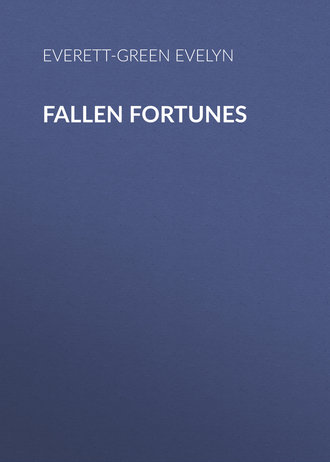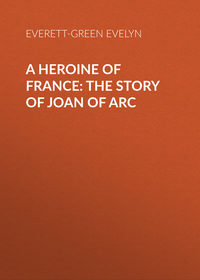 полная версия
полная версияFallen Fortunes
That fond dream had died its own death when the mother was laid to sleep beneath the churchyard sod, and the boy, broken-hearted and indifferent to his fate, had gone forth first to school and then to college, and had known the sweet word "home" no longer.
It was years now since he had seen Hartsbourne. At first he could not bear the idea of revisiting it, to find it empty of the one loved presence which had made it what it was to him. Afterwards his father had ceased to dwell there, had lived more and more in London, had even let the old Manor, as Grey heard before he quitted England for the roving life of the past three years.
He had been somewhat hurt and angry when this was told him; for he had planned to go and bid the old place farewell, and he no longer cared to do so then. True, it was a kinsman who dwelt there now. His father had spoken of him with a cynical smile.
"He is next of kin, after you, my son; and he has a greater gift of thrift than will ever be mine or yours, I take it. If anything should befall you on these wanderings upon which your heart is set, he would be the one to come after me, and take title and estates in his own right. If he like now to pay me my price, he may share the old house with the rats and the bats, for all I care. I love not to spend good money upon leaking roofs and bowing walls. Give me the parks and the coffee-houses, the Mall and the play-house! The devil may fly away with that rotten old house, for all I care!"
This sentiment, rapped out with a good many of the fashionable oaths of the time, had been Grey's first intimation that his beloved old home was falling into decay. As a child it had seemed all the more perfect from that lack of newness or primness, the wildness of the garden, the encroachments of weed and woodland, which mark the first stages of decay. These words had opened his eyes to the fact that his father was letting the old place take care of itself, without regard to the future, and even then he had been conscious of the stirrings of a certain vague resentment. But he had been powerless to act; for although he had just received a small fortune which his mother had hoarded for him, and which had been nursed for him by a kinsman on the Grey side, he had no power to take over Hartsbourne and expend his wealth upon the old home; moreover, by that time the longing for travel and adventure was keen upon him, and he had made every arrangement for a tour of the then known world. His father rather encouraged than lamented his proposed absence; and the youth longed to be his own master, and to feel the strength of his wings.
Yet now, after three years' wandering about the world, Grey found himself gazing with a swelling heart upon the familiar outlines of the region of his childhood's home, and the voices of the past seemed calling him aloud – tender, sweet-toned voices, which had been silent for long, but which awoke now to cry aloud with strange insistence.
The solemn moon rose over the tree-tops as Grey gazed breathlessly upon the dim panorama before him, and instantly the world became flooded with a mystic radiance. A church spire stood suddenly out like a silver beacon, and Grey caught his breath as he watched; for his mother's grave lay beneath the walls of that little church, and the cross upon its apex seemed like a finger beckoning to him to come.
"Yonder is our goal, Dicon," spoke the young man, as his servant, whom he had outridden in his eager haste, spurred up the ridge to his side. "You cannot see the house in this uncertain light; but it lies in yon deep hollow, away to the right from the church. The river winds about it, guarding it from ill, as I used to think in my boyish fantasy. I have seen the harts and does come down from the forest to drink at its waters. Hartsbourne was the name they gave the house, and methinks it was well named. Ah me! – to think how many years have passed since I beheld it all! Hark! Can you not hear the old familiar voices calling the wanderer home?"
The honest servant nodded his head with a smile upon his rugged features. He loved his young master devotedly, and was not unaccustomed to share his musings, whether they were dashed with poetic melancholy or were full of reckless daring. Whatever his master's mood, honest Dick admired him with equal fervour. As their horses picked a way down the descent in the darkness, he hazarded a question.
"You think you will find your noble father there, sir?"
"Why, surely yes, Dicon. Where should a man be when failing in health and strength, if not at his own home?"
"As for that, sir, I know nothing. But you have told me how that he loved not his own house, but gave it over into the hands of his kinsman, that he might take his pleasure elsewhere."
"Very true, Dicon; but that was when he was hale and strong. When ill-health and feebleness overtook him, I doubt not that all was changed. True, I have not heard from him these many months; but that is no marvel, since I myself have been a very wandering Jew. But the gentleman who brought me news of him unawares did say that he was about to quit London, for whose giddy round he had no longer strength or inclination. I have never doubted but that Hartsbourne would be the place of his choice; and hither have I come. I might have learned news of him by going straight to London; but why turn aside from our way for that, when I feel so sure that it is here we shall find him? Doth not nature call every man home to his bed at night, and to his own home at the close of his life? My father is not old – Heaven send he may live long yet; but if disease has crippled his powers and robbed him of his zest of life, I doubt not but that it is here we shall surely find him."
Two days previously the travellers had landed safely at the port of Harwich, having had a safe and speedy crossing from the Hague. The pass given them by the Duke of Marlborough had rendered their journey from Louvain an easy one. From the seaport, Grey had taken the direct road into Hertfordshire, feeling certain that here, and not in London, would he now find his father. He had hoped to arrive ere set of sun; but a few mischances along the road, and the sultry heat of the midday hours, had delayed them. Nevertheless, being now so near, he pressed on steadily. He could not rest so near to home, save beneath the old roof-tree. As the windings of the path grew more familiar, his heart throbbed in his breast. Here they passed the boundary of his father's estate. That broken cross marked the spot. And yonder, sleeping in the moonlight, hoary and beautiful, lay the ruined fragments of what had once been an old priory. He could see that the walls had crumbled away during his years of absence; but one beautiful arch still stood as of old, the delicate tracery showing clear in the moonlight. White owls flitted from the thick wreaths of ivy, and hooted weirdly as they sailed by on noiseless wing. A wild cat leaped out with a menacing yell, and both horses snorted and plunged at the sight and sound. Dick's hand was on his pistol stock; but seeing what it was, he uttered a half uneasy laugh.
"A bad omen, my master," he spoke, as he quieted his horse. "That wild black thing was liker some witch or devil than aught I have clapped eyes on this many a day. Saints preserve us from spell or charm!"
For Dick, albeit a good Protestant by profession, had caught some of the phrases of the people in whose lands he had dwelt, and he was by no means free from superstition, though a bold enough rogue to meet any peril that he could combat with sword or bullet.
"Tush, Dicon! Dost fear a cat, man? For my part, I love all the wild things of the woods, and would be the friend of all. See yonder! There should be a tangled path leading down through the forest glade, and across the stream by a ford to the house itself. Methinks I cannot lose the way, though the path be overgrown, and the light treacherous. – Onward, good Carlos! Fodder and rest are nigh at hand. Within the space of half an hour you and I should both be installed safely at home."
Home! The word was as music to his ears. It seemed to set itself to the beat of the horses' hoofs along the tangled path, which Grey had some trouble in finding. But once found, he was able to trace it without difficulty; and soon the soft whisper of the water fell upon his ears, and the stream lay before him shining in the moonlight.
How beautiful it was upon this still June night! The young green of the trees could not shut out the silvery beams of the moon. The forest was full of whispering voices, and every voice seemed to be welcoming back the stranger-son. The warblers amid the sedges and the fringe of alders along the course of the winding stream filled the air with soft music, not less sweet, if less powerful, than that of the nightingale pouring out his heart in song a little farther away. Sometimes a sleeping deer in some deep hollow sprang up almost from beneath their feet, and dashed, phantom-like, away into the dim aisles of the wood.
And now the wall loomed up before them which separated the house and its precincts from the wilderness of wood and water beyond. Grey well knew this mouldering wall, from which the coping had fallen in many places, and which showed more than one ill-repaired breach in the once sound masonry. The ivy had grown into a tangled mass upon it, and was helping to drag it down. Any active marauder could have scaled it easily. But Grey turned his horse, and skirted round it for some distance. For he knew that a door at the angle gave entrance into the stable-yard, and from thence to the courtyard and entrance-hall of the old house; and as it was already past midnight, he preferred to take this way rather than approach by the avenue to the front of the house.
He turned the angle of the wall, and there was the entrance he was making for. But how desolate it all looked! The double doors had rusted from off their hinges, and stood open, none seeming to care to close them at night. The courtyard was so grass-grown that the feet of the horses scarcely sounded as they entered. A range of stables stood half open, some mouldy straw rotting in the stalls, but no signs of life either in the stables below or the living-rooms above. Grey directed Dicon to the forage store, and bade him look if there were not something to be found there for the horses; and whilst the man was thus engaged, finding enough odds and ends to serve for a meal for the beasts, the master passed through an inner door into a second courtyard, and gazed upward at a range of lancet windows which, in former days, had belonged to the rooms occupied by the servants.
Not a light glimmered in any casement; not a dog barked challenge or welcome. It was not wonderful that the house should be dark and silent at such an hour; but it was more than darkness which reigned here. There was a look of utter desolation and neglect brooding over the place. Broken casements hung crazily, and swung creaking in the night air. Tiles had slipped from the roof, chimney stacks seemed tottering to their fall. True, the great nail-studded oaken door, which Grey well remembered as leading through a long arched passage past the servants' quarters and into the front entrance-hall, was closed and locked; but rust had eaten deep into all the iron work, and cobwebs hung in festoons from the eaves of the dilapidated porch.
In vain Grey beat upon the door with the pommel of his sword. Not a sound from within betokened the presence of living creature. A sudden fear shook him lest he had come too late. This idea had never troubled him before. His father was still young in years. Dissipation might have weakened him, made him an easy prey to disease; but surely, surely had aught worse than that befallen, he would have heard it – he would have been summoned back. It was not any very tender bond that had existed betwixt father and son; but after all, they had no one else. Grey felt his heart grow suddenly cold within him.
Then a new idea entered his head. He turned away from the door, and passed hastily through the courtyard into a walled enclosure beyond, which had plainly once been a fine kitchen-garden, where giant espaliers still lined the paths, and masses of apple blossom glimmered ghostly in the moonlight. Striding along one of the paths under the house wall, where shuttered windows, looking like blind eyes, gave back a stony stare, he reached at last a quaint little offshoot of the house, set in an angle where house and garden wall joined; and he uttered a short exclamation of satisfaction as he saw that here there were traces of habitation in clean, bright window panes, flowers in a strip of border beneath, and a door that looked as though it could move upon its hinges. Upon this door he thumped with hearty good will.
"Jock! Jock! Wake up, man – wake up! Don't tell me that you are a ghost too – that the old house is peopled only with ghosts of the past. – A dog's bark! Good! Where there is dog, there is man. – Wake up, Jock! Wake up and open the door. Have no fear. It is I – the young master."
"God bless my soul! Ye don't say so!" cried a cracked voice from within. – "Quiet, Ruff; be still, man! – Yes, yes, I'm comin', I'm comin'."
The sound of a bolt slipped back gave evidence of this, and next moment the door was opened from within, a shaggy head was thrust forth, and an old man, evidently just risen from his bed, gazed for a moment at the intruder, who stood plainly revealed in the moonlight and uttered a heartfelt exclamation.
"Heaven be praised! – it is Sir Grey himself!"
The young man fell back as though before a blow. "Sir Grey! What mean you by that, Jock? Sir Grey!"
"Why, master dear, you surely have heard the news! You have been Sir Grey since the week after Christmas."
"You mean – my father – nay, Jock – how can I speak the words?"
"He died two days after Christmas, Sir Grey. He had me with him to the last. He never trusted that knave of a kinsman, not he, though he had let himself get fast into his clutches. Ah, if you had but been with us then! Woe is me! for we wanted you sorely. It was hard upon All Saints' Day that the old master came back. He was sick; he had lost the use of his limbs. The leeches said they could do naught for him, but that he might live to be an old man yet. He made light of it at first. He vowed he would cheat them all. But we all saw death in his face. In two months he lay over yonder by the side of our sweet lady."
Jock, though no great speaker at ordinary times, had made, for him, a long speech, because the young master said not a word, but stood leaning against the angle of the wall as though overcome by the news he had heard.
"And why was I not sent for?" The words were a whisper.
"You were, Sir Grey, you were – leastways the master told me so. He said that Mr. Barty had written many letters, and sent them after you by trusty messengers. But Lord, if 'twere only what that rogue said, belike the trusty messenger was nothing better than the fire, into which he dropped his own letters after satisfying the master by writing them."
"What mean you, Jock?" asked Grey, with dry lips. "And who is this Mr. Barty of whom you speak?"
"Faith, none other but him as hopes one day to style himself Sir Bartholomew Dumaresq – your father's cousin, Sir Grey, and next of kin after you. 'Tis he as has got his grip so fast upon Hartsbourne that it'll be a tough bit of work to shake it off. He's got mortgages on the place, the old master told me at the last, and he's been squeezing it like a sponge these many years – cutting the timber, grinding the tenants, living like a miser in one corner of the house, letting all else go to wrack and ruin, that there may be nothing for the heir to come into. Oh, the master saw through him at the last, that he did; but 'twas too late then. Here he is, stuck fast like a leech to the old place, and sucking its life-blood dry, and protected by the law, so that even you can't touch him; the master told me that before he died. He'd got him to sign papers when he was merry with wine, and knew not nor cared what he signed. So long as Mr. Barty supplied him with money, he cared for naught else; and now he's got such a grip on house and lands that it'll be a matter of years before ever he can be got out, if ever that day come at all."
A numb feeling began to creep over Grey. He felt like one walking in a bad dream. The blow of hearing of his father's death was a heavy one. It seemed to shake the foundations of his life to their very base. And now his home was lost to him! Little as he understood the machinations of his kinsman, he grasped that he had come into nothing but a barren title and nominal possession of a ruinous and dilapidated old house, the revenues of which were in some way alienated to another. He had heard such tales before. He did not discredit old Jock's recital. It fitted in only too well with what he knew of his father's recklessness and selfish expenditure, and his kinsman's artful grasping policy. So, after all, he had come to a home that was not his; and he would have to face the world again as something very like a beggar.
Old Jock's hand upon his arm aroused him to a sense of outward things. Dicon had come up, and was listening with wide eyes and falling jaw to the recital of the same story as had been told in outline to Grey. The fuller details only made it sound more true and lifelike.
"Come in, Sir Grey, come in. There's bite and sup for you in the cupboard. The old master didn't forget me, and I can make shift to earn my bread by hook or by crook even without regular wage. Come in, come in, and I'll give ye what I've got for ye. 'Twas all the old master had left from his hoard; but he said it would give you a start in life, and that your wits must do the rest. He gave it me private like, when Mr. Barty was off the place, and I buried it beneath the hearthstone that same day. 'Tis all safe for you, Sir Grey; and you won't go penniless into the world, for all that this villain of a kinsman reigns at Hartsbourne, where you should be."
CHAPTER III.
THE SCHEMING KINSMAN
They sat face to face in a room which Grey well remembered. It had been lined with folios in those days – great tomes in which he had dug with breathless delight, for the treasures of wood-cuts and the strange stories they possessed – and illuminated missals, where, amid a mass of gilding and wonderful colours, the story of saint or martyr could be traced. Other and more modern works had been also there, specimens of the art of printing as carried on through the days of the Stuarts. But where were all these tomes and scrolls and books now? Grey swept the empty shelves with quick, indignant glances. A motion of his hands seemed to ask the question his lips were too proud to speak.
A small and wizened man sat before him, his eyes furtively scanning the young man's face with an unwinking attention. He could not have been old, this parchment-faced kinsman – not more than five-and-forty at the most – and yet he wore the look of an old man, and was fond of speaking of himself as such. The unhealthy pallor of his face bespoke a life of inaction, and the lines and wrinkles on the puffy skin, and the emaciation of the frame and claw-like hands, seemed either to indicate some wasting disease, or else a miser-like habit of life which denied its owner the common necessaries of existence. Grey fancied that perhaps this latter surmise might be the right one; for he himself would have fared ill at breakfast that morning, had it not been for the fish which Dicon had caught and cooked for the pair, ere he presented himself at the meal to which his kinsman invited him on hearing of his advent to the old house. That meal had been so frugal that Grey almost disdained to partake of it. And now he and Mr. Dumaresq sat facing each other in the green light which fell through the big north window, against which the trees almost brushed, rather like combatants in a duel, each of which measures the strength and skill of the other before attempting to strike.
The wizened man made a deprecating gesture with his hand, and answered the unspoken question.
"Sold, sold – every one of them! I did my best to keep them in the family, but it was of no avail. Your father would have money – no matter at what cost. I was toiling all I knew for him, as it was. Everything that could be got out of the estate I squeezed out for him. Never man had so faithful a steward as I was to my poor cousin. But it was like pouring water through a sieve. Nay, you need not look so fiercely at me. I am not traducing the dead. Ask those with whom he consorted. Ask the boon companions he made in gay London town. Ask his very servants, an you will. You will hear the same tale from all. He spent money like water. Never did he trouble his head where it was to come from. I have papers; I can show them if you have knowledge of the law enough to understand. I advanced him sum after sum, on such poor security as this tumble-down house and impoverished estate has to offer. I beggared myself for his sake. He was the only kinsman left me. I could deny him nothing. And when my funds were gone, I must needs squeeze all that could be squeezed out of the house and land. The books went; the timber was felled; the pictures were taken away; the best of the furniture went to adorn the houses of merchants and parvenus. I argued and entreated in vain. When the wild fit was upon him, Hugh would listen to nothing. I had to content myself with serving him, by seeing that he was not cheated beyond bearing by the crew of harpies he had around him. At least I secured him equitable prices for family heirlooms; but it went to my heart to see them vanish one by one. And now, what is left save the shell of the old house, and an estate burdened and impoverished well-nigh beyond the power of redemption?"
He heaved a great sigh, looking cunningly at the young man out of the corners of his ferret-like eyes. Grey's glance was stern and direct. His words were quietly and coldly spoken.
"We will see about that. I am here to take up my burden. I will learn whether or not Hartsbourne be past redemption."
"You!" cried 'Mr. Dumaresq quickly; "and pray what can you do?"
"I can live here quietly, and see what can be done towards retrieving the past. Even if I toil with my own hands, I shall think it no shame, if it be for the home of my forefathers."
"You live here!" sneered the other, seeking to mask the sneer by a smile; "and by what right will you do that, pray?"
"I am the owner," answered Grey proudly. "I presume that I have the right to live in my own house, and to administer such revenues as may be left to the estate?"
"Oh yes, fair kinsman, so soon as the mortgages be paid. I will get them out for your high mightiness to examine. Pay them off, and house and manor are yours to do with as you will. But till that time come, I, and not you, am master here. The revenues are mine; the house I have the right to occupy, to the exclusion of any other. It is all writ fair to see – signed and sealed. Will you see the papers for yourself? They will make pleasant study for a summer morning."
"I will look at the papers anon," answered Grey quietly; "but first I would know from you what it all means. It is you, not I, to whom Hartsbourne belongs, then? You are the master, and I am the guest?"
"For the present, yes; but a welcome guest, none the less," spoke the older man with a repulsive leer. "The situation, my bold young cousin, is easily understood. Your father loved not the old family house. I did love it. Could he have sold it, it would have been mine long since; but he had not the power to alienate it from the title. But he did all else that was possible. He raised mortgage upon mortgage upon it – first on the house, then on the land. I came to live in the house, and paid him rent for it once. Then I supplied him with money and took up the mortgages. He and I had been boys together. The tie between us was strong. I verily believe he was glad to have me here, and when he was sick and smitten with mortal disease he came hither to die, and I was with him to the last. He was grateful for my devoted service. He was glad to think that I should live on here afterwards. 'It is no life for a young man,' he said almost at the last. 'Grey will carve out a career for himself. Here he could only rot and starve like a rat in a hole.' And I pointed out that you were my natural heir, and that you might not have very long to wait before coming a second time into your inheritance."









